West Hartford Postpones Action on Expanding Food Scrap and Unit-Based Pricing Pilot

Audio By Carbonatix
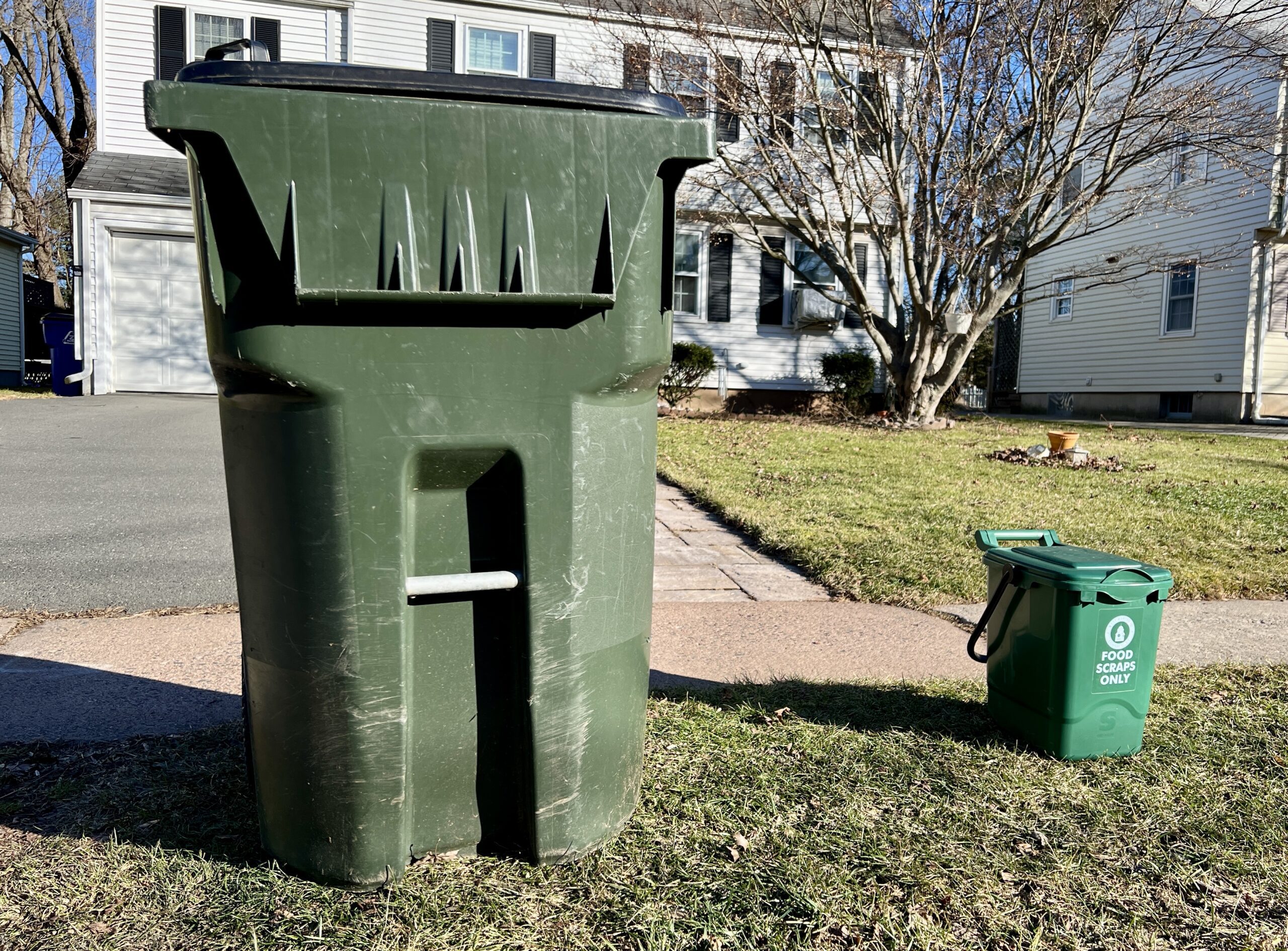
In early 2024, a trash barrel and food scrap container at the curb are ready for collection in the Morley neighborhood pilot area. Photo credit: Ronni Newton
A resolution that was to be considered by the West Hartford Town Council on Tuesday, June 25, 2024 was withdrawn from the agenda. [Updated]
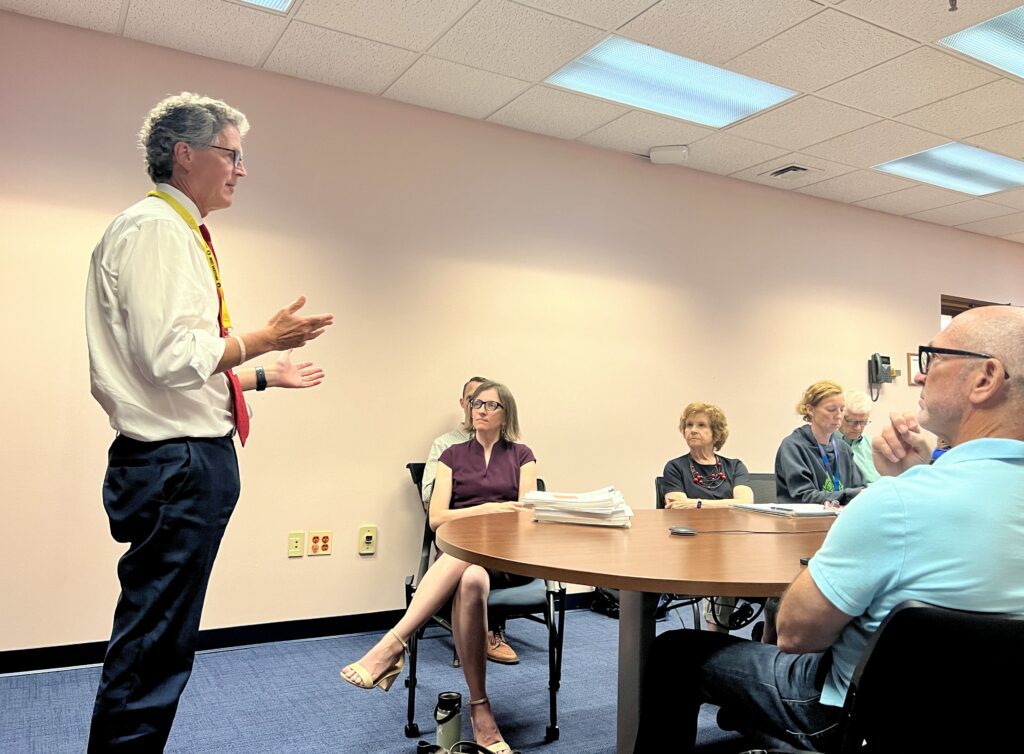
Town Manager Rick Ledwith speaks at a meeting of the Sustainable West Hartford Commission on Monday, June 24, 2024. Photo credit: Ronni Newton
By Ronni Newton
The West Hartford Town Council had planned to vote at its Tuesday, June 25, 2024 meeting on a resolution for a town-wide expansion of a pilot program for curbside collection of food scraps in conjunction with the implementation of a unit-based pricing model, but the resolution was withdrawn from the agenda and action will be delayed until later this summer.
The withdrawal of the resolution from the agenda means that public comment regarding the item was not permitted at Tuesday night’s meeting in accordance with the Council’s charter. Several people had signed up to speak about the issue but were told they could not comment once it was removed from the agenda.
Town Manager Rick Ledwith told the Sustainable West Hartford Commission at its June meeting, held Monday night, that while he initially thought it would be okay from a procedural standpoint to have the Town Council consider a “Resolution Concerning the Curbside Food Scrap Collection and Unit-Based Pricing Pilot Program” on Tuesday, which would have include accepting a $1.5 million grant from the Department of Energy and Environmental Protection (DEEP) to expand the pilot that has been in place in the Morley neighborhood for the past year, he has been advised that because the expanded pilot will be mandatory, the Council will need to also adopt an ordinance and that should be done at the same time.
Members of the Sustainable West Hartford Commission, and a Waste Working Group of Commission members and other volunteers have been working for months on educating the community about the success of the Morley pilot and supporting the town-wide expansion. Those in attendance Monday night were upset that the Council would not be considering the resolution Tuesday night – particularly since DEEP has already given the town more time to consider the expansion and has continued to fund the Morley pilot beyond its initial Feb. 1 planned expiration.
Waste Working Group members fear that DEEP will no longer be willing to provide the grant if there is further delay.
“The work of this group has been nothing short of incredible,” Ledwith said Monday night, after Waste Working Group Chair Rachael Virgin described their efforts over the past months. She touted the success of the Morley pilot, and said the 50% participation was “the highest participation rate for a pilot like this in the nation” and resulted in a 50% reduction in the volume of trash on the part of those who did participate. According to Public Works Director John Phillips, on average 1.27 tons per week has been diverted from the waste stream in the pilot area.
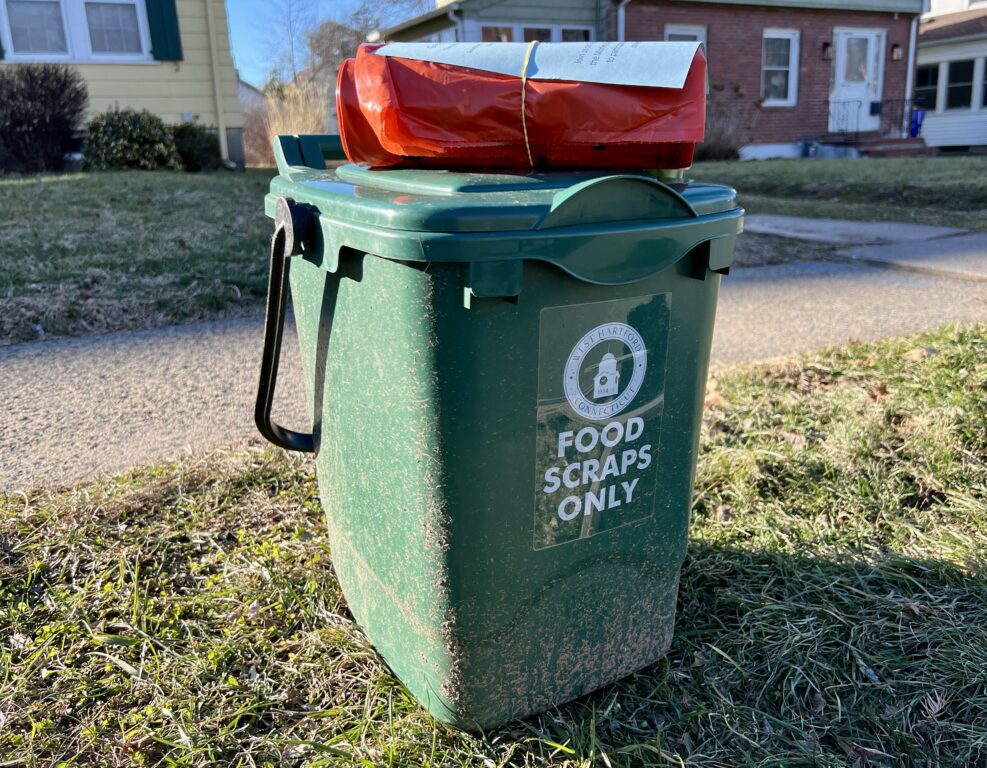
During the Morley pilot, participants had food scraps collected weekly at the curb, and received orange bags for trash disposal as part of the unit-based pricing component of the initiative. Photo credit: Ronni Newton
During the pilot, food scraps have been picked up weekly by Blue Earth Compost and brought to Quantum Biopower in Southington where they are converted to energy and compost. The 685 households in the pilot area were given green food waste bins and green bags for use in those bins, and orange bags to be used for their trash for the unit-based pricing component which measured the number of trash bags used.
Virgin said group members had thousands of conversations through forums they conducted, at Earth Day, at Celebrate! West Hartford, as she held up a stack of copies of hundreds of letters in support of expanding the pilot, while acknowledging roughly two dozen letters in opposition.
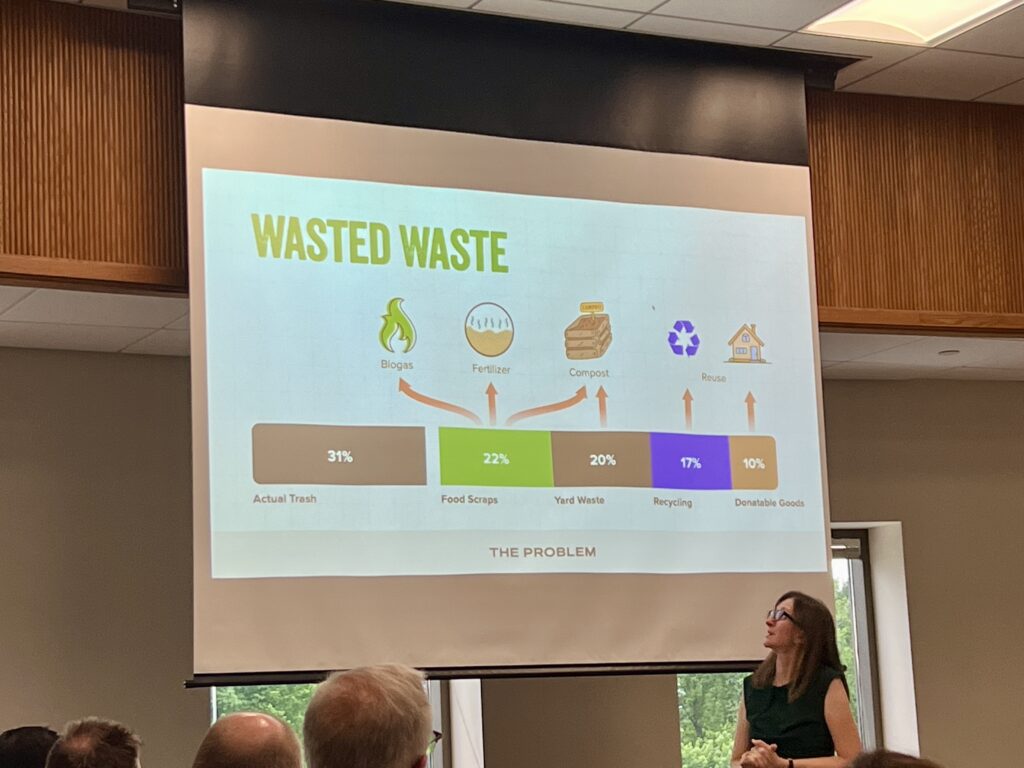
Rachael Virgin, chair of the Waste Working Group, presents information at a June 6, 2024 meeting of the Town Council’s Public Works, Facilities, and Sustainability Committee. Photo credit: Ronni Newton
Ledwith said the June 6 meeting of the Council’s Public Works, Facilities, and Sustainability Committee, where Virgin gave a presentation, was a great meeting, and while at the time he thought it would be possible to move forward with a resolution accepting the DEEP grant and then following with an ordinance, he has been advised that because the town-wide pilot will be mandatory, the ordinance needs to be adopted at the same time.
Participation in the Morley pilot was voluntary, and participants were not charged for any of the supplies – including additional orange bags for trash – nor were there consequences for noncompliance. A town-wide pilot would be mandatory, however, and would involve being given one free 15-gallon trash bag per week along with one 8-gallon food scrap bag, but involve a cost for purchasing additional bags. Decisions would still need to be made about the cost of the bags – perhaps $1 each – as well as how they would be distributed, where they would be sold, and how “hardship” would be determined for those who need help paying for additional orange bags.
“I am being asked to do these things before the resolution comes to the Council,” said Ledwith.
He said he is not “just blowing smoke,” said that Mayor Shari Cantor, who is out of town on vacation, is completely in support of an expanded pilot, but “I should have done it up front,” Ledwith said. “I opted to move forward and we shouldn’t have.”
Corporation Counsel Dallas Dodge shared the following statement with We-Ha.com on Tuesday morning: “A Pay As You Throw program for residential trash – even a temporary town wide ‘pilot’ – will require changes to the Town Code in order to establish penalties and enforcement mechanisms for noncompliance. This requires more time to craft and review local legislation in committee, and any change to the Town Code will ultimately require a public hearing if the Council wishes to proceed with a Pay As You Throw program. Other options for sustainability, such as reducing the size of receptacles for non-recyclable waste or establishing a voluntary town wide food scrap recycling program similar to the Morley neighborhood pilot, may be accomplished without an ordinance but require more study with regard to funding and logistics.”
Adoption of an ordinance has a set legal procedure, and requires not only drafting of wording by the Corporation Counsel’s Office, but also receipt by the Town Council at a meeting, and the setting of a public hearing to take place not sooner than 30 days nor longer than 65 days from the receipt of the ordinance. The public hearing is usually held just prior to and on the same night as a Council meeting, with a vote scheduled during the meeting.
While it may be possible to have the wording for an ordinance developed in time for the Council to receive it at its next meeting, scheduled for July 16, Ledwith said it’s more likely that the draft ordinance will first be discussed by the Public Works, Facilities, and Sustainability Committee, received at the Town Council’s Aug. 6 meeting, and set for public hearing and vote on Sept. 10 at the earliest.
Resident Diane Duva was adamant that Council should have a chance to vote on the resolution on June 25. “That’s the point of a pilot,” she said, but Ledwith said the pilot can’t be implemented without an ordinance.
“If we don’t get the grant, there are other things we could pursue,” Ledwith said, in order to reduce the town’s municipal solid waste. That includes implementing just a food scrap collection program and swapping out existing 95-gallon trash barrels for smaller barrels. The town is also planning updates to the Public Works campus to create a Materials Solution Center for residents to divert additional items from the waste stream.
Duva, and Sustainable West Hartford Commission Chair Bernie Pelletier, both said they feared momentum, in addition to the grant, to implement a town-wide pilot will be lost due to further delay, but Lediwth said, “It’s coming back. It is coming back.”
Ledwith’s also shared an official statement about the decision to withdraw the resolution from the agenda.“West Hartford is dedicated to adopting sustainable waste management practices to minimize solid waste disposal in our community. The recent pilot program in the Morley neighborhood was highly successful, prompting my recommendation to implement certain elements, particularly food waste recycling, across the town. However, it is crucial to proceed correctly. We need additional time to thoroughly study and evaluate best practices for the entire community, and for our staff to draft and for committees to review local ordinances and regulations necessary to implement the program.”
Background
The impetus for the Morley pilot was to determine if the combination of food scrap diversion with unit-based pricing would be a way to move the needle on the town’s municipal solid waste. DEEP is far from meeting its statewide diversion goals, and over the past decade, despite recycling education and a trial of weekly recycling, West Hartford has effected minimal change in its municipal solid waste.
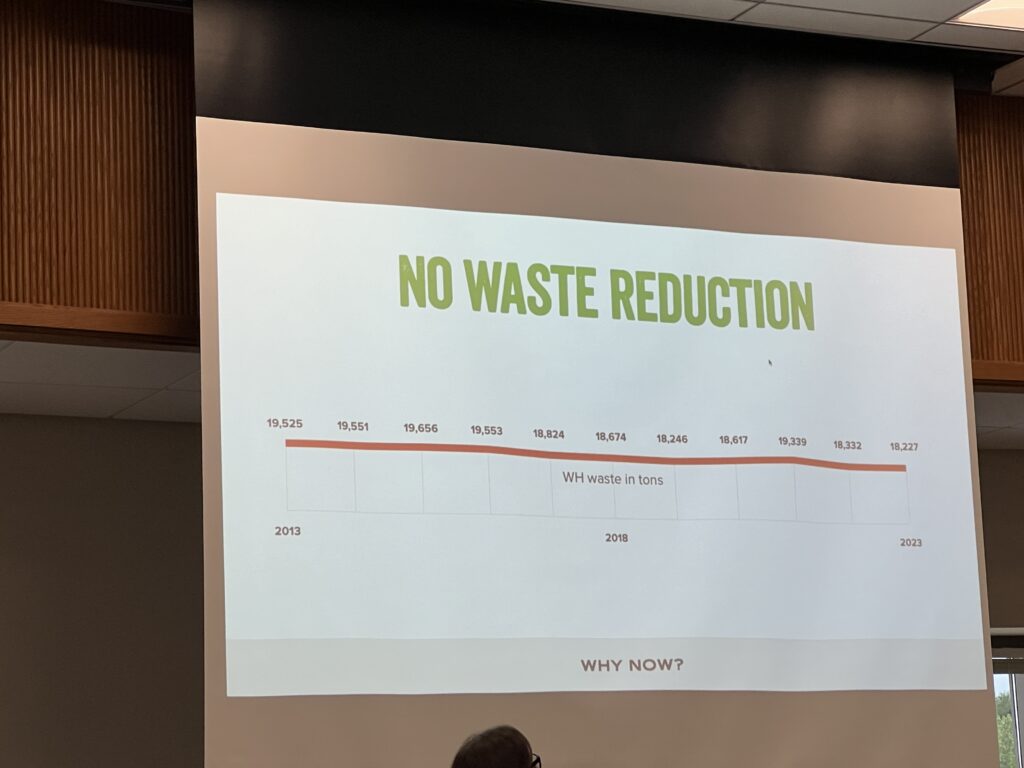
The needle hasn’t moved in the past decade, said Rachael Virgin, chair of the Waste Working Group, at a June 6, 2024 meeting of the Town Council’s Public Works, Facilities, and Sustainability Committee. Photo credit: Ronni Newton
“It’s a utility cost. We have to pay whatever it is,” Phillips said previously of the current model. But if residents treated it as their own utility cost, the overall volume would likely decrease – especially when combined with food scrap recycling – and those who have less waste would not have to subsidize the trash generation of others.
While not directly impacting West Hartford, the closure of the Materials Innovation and Recycling Authority (MIRA) facility in Hartford last year brought the crisis to the forefront and the news, and roughly 40% of Connecticut’s trash is now sent out of state, with transportation adding to the environmental impact. West Hartford’s trash is disposed of in Bristol at ReWorld (formerly called Covanta), and while Public Works received a comparatively favorable contract with tipping costs of $95 per ton for the upcoming fiscal year, the costs will continue to escalate and are far higher than the cost to dispose of recycling and food scraps – which is why there are economic as well as environmental benefits to reducing trash. The Waste Working Group estimates that, based on the results of the Morley pilot, if the town were to adopt unit-based pricing combined with food scrap collection it would save $11 million in tipping fees over the next 10 years.
The idea of implementing unit-based pricing in West Hartford was first floated in 2016, subsequently, but shelved due to significant resistance from the community. Now efforts are being backed by the state – which in 2023 funded pilot programs through a total of $5 million in grants – in an effort to show residents that this will work to reduce the amount of waste produced. West Hartford was one of 15 municipalities and three regional groups in Connecticut to receive a funding for what became the Morley pilot announced in late 2022. The town was initially given $106,200, but another $7,800 was added to the grant in order to cover the costs of enhanced reporting and the purchase of higher quality receptacles for the curbside food scrap collection.
Phillips has said the last time there was this much focus on trash in West Hartford was in 1990, when the town’s sanitation department was eliminated and trash removal was outsourced.
Like what you see here? Click here to subscribe to We-Ha’s newsletter so you’ll always be in the know about what’s happening in West Hartford! Click the blue button below to become a supporter of We-Ha.com and our efforts to continue producing quality journalism.



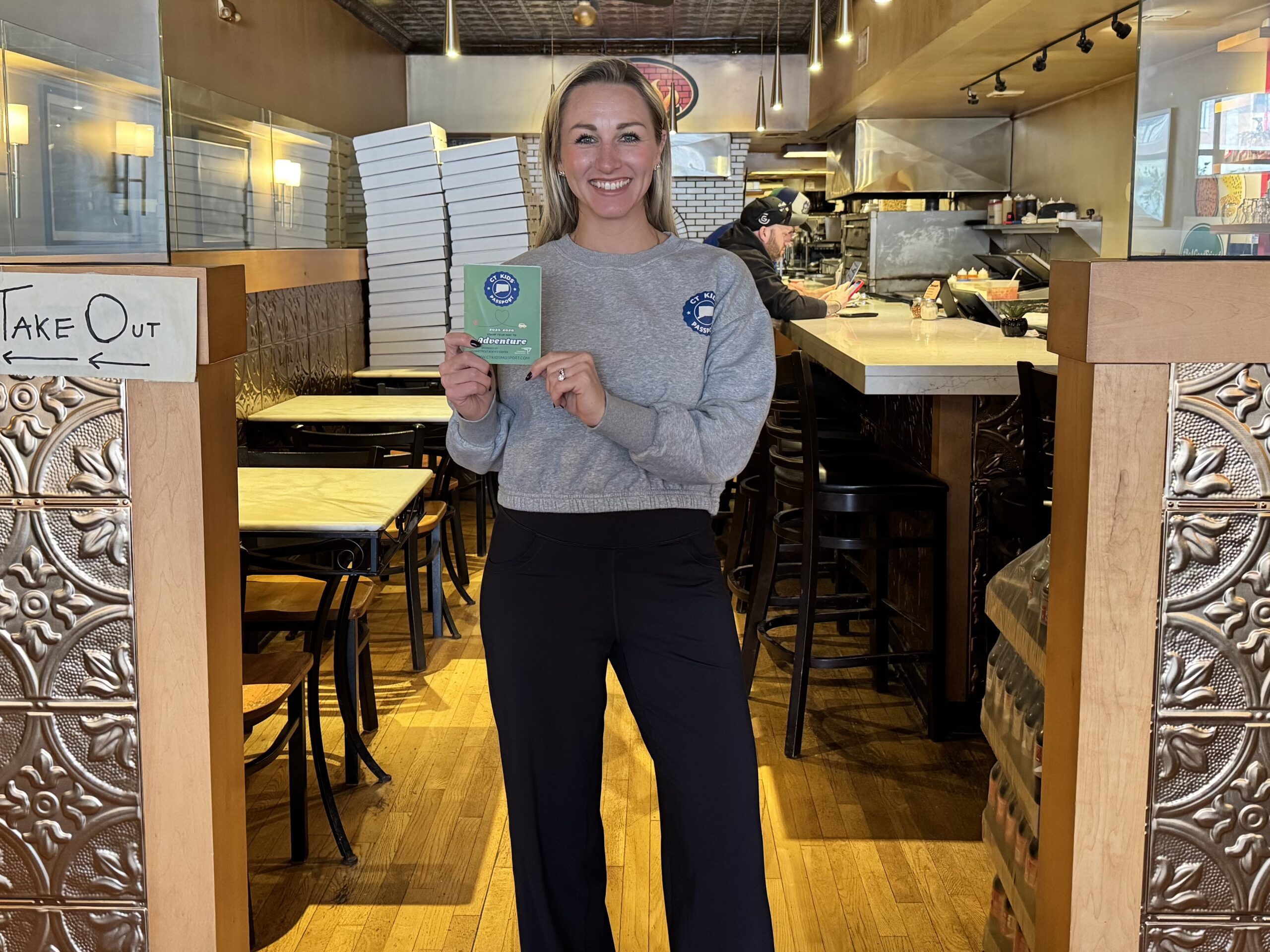
this is just a further sad statement about what the Democrat leadership in town wants to do. They want to force submission and compliance on people to achieve their agenda.
they they tried to do it with vaccines during Covid and they failed miserably. submit to us or else we will ruin your lives.
Something seems off with requiring agenda items to be finalized 10 (or 7?) days before the TC meeting but being able to then pull them off the agenda at any time without discussion, in this case many finding out only the night before. This was a significant lift by a lot of hard-working unpaid members of the community to make a deadline so a $1.5 million grant wouldn’t be put in jeopardy. I’m disappointed this could be allowed to occur and hopeful the town governance structure be evaluated so it wouldn’t happen again.
Outside of all that, I lived in a town with a pay-per-bag system in place,… in the year 2000. This isn’t a new concept and shouldn’t be political. CT has a trash problem, towns need to figure it out or the premium for shipping trash out of state along with the portion of general taxes used for trash collection will continue to rise.
there needs to be equitable cost adjustments according to family unit size. a single individual may not fill a costly bag for more than a week. where do they store food waste without throwing away a huge bag? rolling barrels are more manageable for some people. how will they transfer bags to curb. town should resolve these issues first.